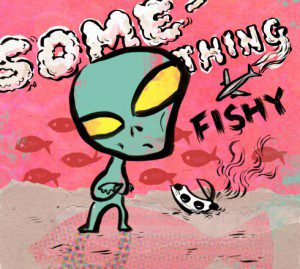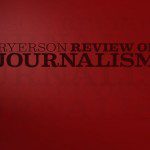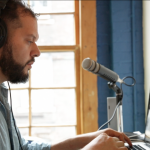Chemtrails, false flags and 9/11, oh my!
All but ignored by mainstream media, conspiracy theorists search for an alternative audience. These days, fellow "truthers" aren't hard to find

Illustration by Hyein Lee
There’s a blizzard outside, but over half of the chairs inside this Queen Street West store are full. The store isn’t just any store in downtown Toronto; it’s Conspiracy Culture, or what co-owner Patrick Whyte calls a “taboo, magic happy place” for people who are interested in everything from alien phenomena to political conspiracies. And the crowd isn’t here to see just anyone—they’ve come partly to hear the latest news on the 9/11 Truth movement and partly to see the man delivering it. Barrie Zwicker is the leading 9/11 “Truther,” an activist, a media critic, and, as the popular media likes to refer to him, a conspiracy theorist.
“Who knows? Maybe I’m just a paranoid schizophrenic,” Zwicker jokes with the audience. But he isn’t mentally ill—before all else, he’s a journalist. Apart from working forTheGlobe and Mail,Toronto Star, Vancouver Province, CBC and Vision TV, Zwicker spent seven years teaching journalism at Ryerson University. It figures, considering he reminds me of nearly every journalism instructor I’ve ever encountered—captivating, but a little eccentric, with the propensity to become overwhelmed and sidetracked easily. By the end of his presentation, he’s mopping his brow with a handkerchief and his forehead has turned a shade of red. It’s only too easy to envision him in front of a classroom of students.
Tonight though, the seats at Conspiracy Culture are filled with Zwicker’s fellow truth seekers, who have gathered to celebrate the launch of a new book: 9/11: Solving the Greatest Crime of All Time—The Best of Global Outlook, Volume 1. Although there are a number of men with dreadlocks in the room, the crowd ranges in age and gender. A group of men from Owen Sound—one sporting a “911=Inside Job” shirt—even drove down in the inclement weather just to see Zwicker speak. And when it’s suggested that Zwicker should be nominated for the Order of Canada, some of the crowd stands up to applaud.
Like Zwicker, a number of theorists are journalists who worked for traditional media sources, but now dedicate their careers to explaining the unexplained. William Thomas, a journalist whose editorial writing has appeared in the Globe and the Star, now writes about the terror politics of 9/11 and the danger of chemtrails (the trails left behind a jet that allegedly contain harmful chemicals). Other journalists, such as CBC’s Neil Macdonald, who questions the motives of the U.S. “War on Terror” both on-air and in print, continue to work within the confines of the mainstream press. Even Naomi Klein’s book The Shock Doctrine: The Rise of Disaster Capitalism, has been heralded by conspiracy theory communities for supporting theories about the economic motivations behind Sept. 11. (Klein disavows that her research is necessarily proof of a conspiracy.)
And, at least on the issue of what exactly happened on 9/11, a Zogby poll conducted last year found that more than 51 per cent of U.S. citizens are now calling for further investigations into the attacks on New York and Washington. Despite their reputation for being of the tinfoil hat-wearing persuasion, conspiracy theorists in the “War on Terror” era have been gaining ground and credibility as alternative news sources.
For Zwicker, who says he was always destined to become a media critic, joining the editorial team at Global Outlook: The Magazine of 9/11 Truth was a natural progression. In January 2002, he produced the first of a six-part series examining the events of 9/11 for Vision TV—a series that would later become the cult hit documentary, The Great Deception. “I remember that when I first went public with my serious questions about the official 9/11 story,” Zwicker says, “a mainstream journalist solemnly told me that I was making a huge mistake, that I would ruin my reputation and shred my credibility being associated with such kooky ideas.”
It was far from a mistake. Zwicker’s popularity has since grown to levels beyond that of his career as a mainstream journalist, and he went on to produce a follow-up documentary, The Great Conspiracy, organize the International Citizens’ Inquiry Into 9/11 and publish Towers of Deception: The Media Cover-up of 9/11.He’s currently working on a book about historical false flag operations: instances where governments act but blame their actions on another entity, usually to gain public support for an unpopular decision, such as going to war.
But Zwicker’s career choices haven’t been fuelled by fame or financial motivations—even his most popular videos are sold at near cost and are available for free on YouTube. “A labour of love is usually a labour of loss,” he says.
With this level of publicity, it’s not that mainstream news sources ignore Zwicker and the claims of the 9/11 truth seekers—quite the contrary, conspiracy theories regularly appear in headlines. But instead of objectively discussing alternative evidence or histories, mainstream journalists often engage in personal attacks.
Case in point: when former Star columnist Michele Landsberg dared to admit that she questioned the official story, she was ridiculed by commentators at another newspaper. In a May 2003 profile of Zwicker, she wrote, “And if you call him a conspiracy theorist, call me one, too, because I agree with Zwicker when he says, ‘I don’t know exactly what happened but something smells fishy.’ Even more rank-smelling is the refusal of most Canadian journalists to ask embarrassingly uncool questions about one of the worst catastrophes of our time… in these strange times, asking direct or probing questions about 9/11 will get you instant put-downs.”
No more than two days after Landsberg’s column was published, the National Post made her the brunt of an instant put-down. In an editorial titled “Michele Landsberg loses it,” the Post responded that the reason journalists “haven’t reported on [9/11 conspiracy theories] is because they’re good reporters.” The editorial concluded, “Poisonous delusions such as these do not belong in a mainstream newspaper.” While the editorial legitimately questioned Landsberg beliefs, it did so in less than an objective manner—by referring to Zwicker’s theory as an “eccentric crock” and failing to provide any counter-arguments.
Five years later, the debate still holds strong. Jonathan Kay, comment pages editor at the Post, was the editorial managing editor at the time of the Landsberg editorial. “I’m a purist when it comes to free speech; I don’t think it should be censored. But when conspiracy theories pop up in a mainstream newspaper, they deserve to be smacked down,” he says. Kay’s argument for why it shouldn’t appear in the mainstream press is simple: “It’s loony. It’s crazy.”
Richard Syrett, host of Newstalk 1010’s conspiracy theory call-in show, wishes more journalists were interested.“ Nearly all that toil in the vineyards of mainstream news,” he says, “are arrogantly dismissive of most, if not all, conspiracy theories.”
And when mainstream media does challenge the views of truth-seekers, Syrett says it’s not necessarily a fair or objective debate. “It’s the straw man argument,” he says. “They take the most ridiculous aspects of the debate and hold it as representative of all 9/11 truth seekers.” For example, Mark Steyn’s August 30, 2006Maclean’s article, “Call Me Crazy. I Blame Terrorists,” attacks the idea that a mid-air plane switch took place—a theory that isn’t necessarily prevalent amongst 9/11 researchers.
In addition to fellow journalists working against them, there are other, more pragmatic reasons why writing beyond the news wire has become increasingly difficult for journalists dedicated to researching alternate sources of information. Syrett and Zwicker agree that time constraints and deadline-driven content make intensive research near impossible. “You’ve got weekly deadlines,” says Syrett, “so you’re not going to be able to scratch beneath the surface to get to the truth.”
It’s hardly a secret—or a conspiracy—that media concentration is also a major roadblock. “The mainstream can’t afford to tell you the entire truth,” says Syrett. “They have sponsors, they get jittery when certain things are talked about.”
Zwicker says that although he believes there is “marvelous” journalism in today’s mainstream press, he also believes it is predominated by poor quality reporting. “It’s superficial, it misses the points and it’s not courageous or insightful,” he says, “nor does it have a historical dimension.”
But historian Michael Bliss, who also responded to Landsberg’s column calling it “the single most appalling piece of writing [he] has ever read in a reputable Canadian newspaper,” says the mainstream press doesn’t cover conspiracy theories with good reason. “It’s for the same reason that the mainstream press doesn’t cover the latest developments in holocaust denial,” he says. “The real problem is that you can make a conspiracy theory about anything.”
Kay agrees that judgment calls are the bottom line when considering publication. “Anyone should be free to give whatever theory they want about 9/11 or any other historical event,” he says. “But when you use a tragedy to advance this weird theory that the American government precipitated the terrorist attacks for its end, the effect of it is to stir up anti-American hate on a fraudulent pretext. It’s toxic to public discourse.”
Kay isn’t alone in his belief. Ottawa Citizen journalist Robert Sibley says, “[Conspiracy theories are] a way for desperate people to make sense of the world.” And freelance journalist and longtime political commentator Gwynne Dyer has also gained notoriety for his debunking commentary. In a March 2007 editorial aboutLoose Change, a viral 9/11 conspiracy theory film that, according to the film’s producers, has been viewed by over 50 million people, Dyer argues that it’s extraordinary that since 9/11, “not one of these 10,000 accomplices to mass murder has yielded to the temptation of instant fame if only they blow the whistle on the greatest conspiracy in history.” It’s an argument that’s hard to ignore.
But truth seekers haven’t been entirely dismissed by mainstream media. In late 2003, the fifth estate aired an episode examining the conspiracies surrounding 9/11, which resulted in an unprecedented amount of viewer mail. Viewers praised the show for being “the first national news network on this continent to seriously raise questions about the events surrounding 9/11.” In September 2006, CBC News: Sunday aired a follow-up show on “9/11: Truth, Lies and Conspiracy.” And according to Syrett, his show, which is aired on mainstreamNewstalk 1010, is currently tied for the top show in its market and time slot.
But in general, Syrett argues, the media keep one eye at all times on the advertisers, and news consumers now need to go beyond the mainstream for better explanations.“ Those that decide they really want to get to the truth and aren’t satisfied with the information they’re getting leave the mainstream media,” he says. “Readers and viewers are doing the same thing in droves.”
The crowd gathered at Conspiracy Culture represents a small slice of the population that is interested in alternative news sources. Regardless of whether Zwicker’s version of 9/11 is accurate, he’s asking questions—something Landsberg says 99 per cent of journalists don’t bother to do.
“I learned in journalism to try and identify the really important questions you want to ask,” Zwicker says. “To me, that’s the key to life, let alone journalism. Ask the right questions.”
Jessica Lockhart was the Front of Book Editor for the Spring 2008 issue of the Ryerson Review of Journalism.









































